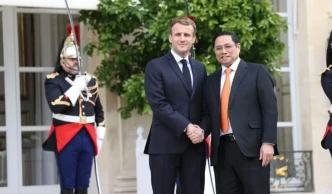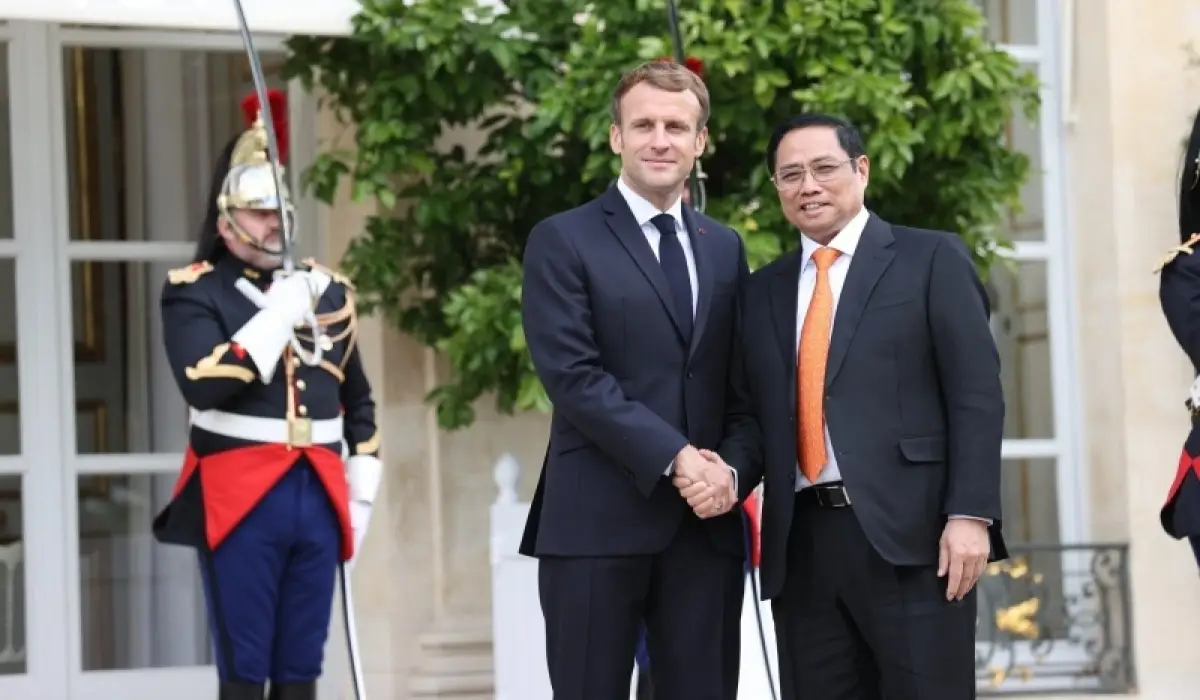In a significant step toward deepening bilateral relations, Vietnamese Prime Minister Phạm Minh Chính held high-level talks with his French counterpart, Francois Bayrou, in Paris on June 10, 2025. The meeting, which followed PM Chính’s participation in the 3rd United Nations Ocean Conference (UNOC 3) in Nice, underscored a shared commitment to advancing the Việt Nam-France Comprehensive Strategic Partnership amid a complex global landscape. As both nations navigate regional and international challenges, the discussions highlighted a mutual desire to bolster political trust, economic cooperation, and coordination on pressing global issues.
Building on Recent Engagements
The Paris talks come on the heels of French President Emmanuel Macron’s state visit to Việt Nam, signaling a period of intensified engagement between the two countries. During the meeting, PM Bayrou expressed appreciation for Việt Nam’s contributions at UNOC 3, particularly its 15 voluntary commitments and initiatives aimed at sustainable ocean management. He noted that PM Chính’s visit reflects the substantial progress in bilateral relations, a sentiment echoed by the Vietnamese leader who congratulated France on hosting a successful conference.
PM Chính emphasized Việt Nam’s view of France as a key partner in its European foreign policy, particularly within the context of the European Union (EU). He reiterated his government’s determination to translate the strategic partnership into tangible outcomes, highlighting Việt Nam’s ambitious development goals. These include becoming a modern industrial nation with upper-middle income status by 2030 and a high-income, developed socialist country by 2045. Such aspirations, he suggested, align with areas where France holds expertise and Việt Nam has pressing needs.
Expanding Cooperation Across Sectors
The discussions covered a wide array of cooperation areas, with both leaders identifying significant potential for growth. PM Chính pointed to sectors such as aerospace, urban transport, nuclear energy, and manufacturing technology as critical “levers” for Việt Nam’s development trajectory. He urged French investors to collaborate with Vietnamese enterprises in strategic industries like automotive and logistics, which could yield high spillover effects for the economy.
In response, PM Bayrou acknowledged Việt Nam’s impressive socio-economic achievements and its rising international profile. He affirmed France’s commitment to strengthening ties in both traditional and emerging fields, ensuring that cooperation matches the ambitions of the comprehensive strategic partnership. Both leaders agreed on the importance of closer coordination to address rapid global political and economic shifts, pledging to contribute responsibly to peace, stability, and development in their respective regions and beyond.
A key focus of the talks was economic collaboration, with an emphasis on trade liberalization and market access. PM Chính called on France to expedite the ratification of the EU-Vietnam Investment Protection Agreement (EVIPA) and to maximize the benefits of the EU-Vietnam Free Trade Agreement (EVFTA). These agreements, he argued, are vital for reducing reliance on third-party markets and ensuring the stability of global supply chains. The leaders also outlined six major measures to enhance bilateral ties, including reinforcing political trust, bolstering defense and security cooperation, and promoting breakthroughs in science and technology, particularly in space science and nuclear energy.
Defense, Security, and Regional Stability
Defense and security emerged as a cornerstone of the discussions, with both sides recognizing their importance in the broader bilateral relationship. The leaders committed to deepening collaboration in this domain, viewing it as essential for addressing shared challenges. While specific details of defense agreements were not disclosed, the emphasis on this pillar suggests a strategic alignment in navigating regional security dynamics.
On international and regional issues, PM Chính and PM Bayrou shared perspectives on fostering global solidarity and resolving disputes through peaceful means. A notable point of agreement was the situation in the East Sea (internationally known as the South China Sea), where both leaders stressed the importance of maintaining peace, stability, and freedom of navigation. They underscored the need to adhere to international law, particularly the 1982 United Nations Convention on the Law of the Sea (UNCLOS), and to settle disputes without resorting to force or the threat of force. This stance reflects a broader commitment to a rules-based international order, a principle both nations appear keen to uphold.
Cultural and People-to-People Ties
Beyond strategic and economic priorities, the talks also addressed cultural, educational, and social dimensions of the partnership. PM Chính expressed gratitude to the French government for supporting the Vietnamese community in France, requesting continued efforts to facilitate their integration and contributions to both French society and Việt Nam-France friendship. The leaders agreed to enhance cooperation in culture, tourism, health care, and education, recognizing these as vital for fostering mutual understanding and goodwill.
People-to-people exchanges were highlighted as a means to renew and deepen traditional areas of collaboration. Such initiatives could serve as a bridge between the two nations, reinforcing ties at the grassroots level while complementing high-level political and economic engagements.
Looking Ahead: Invitations and Agreements
As a gesture of continued collaboration, PM Chính extended invitations to French officials for upcoming events. He urged France to send a high-ranking delegation to the signing ceremony of the United Nations Convention against Cybercrime, set to be hosted by Việt Nam in Hà Nội in October 2025. Additionally, he formally invited PM Bayrou to make an official visit to Việt Nam at the earliest opportunity, an invitation that was warmly accepted.
The talks concluded with the signing of significant agreements, witnessed by both leaders. These included a Memorandum of Understanding between the Việt Nam Academy of Science and Technology and the French Alternative Energies and Atomic Energy Commission, as well as a tripartite cooperation agreement involving Việt Nam’s Department of Geology and Minerals, France’s Bureau of Geological and Mining Research (BRGM), and the French Development Agency (AFD). Focused on the sustainable management of mineral resources and advancing geological knowledge for energy transition, these agreements signal a forward-looking approach to bilateral cooperation.
Analysis: Strategic Implications for Việt Nam and France
The Paris meeting between PM Chính and PM Bayrou carries broader implications for both nations’ foreign policy objectives. For Việt Nam, strengthening ties with France offers a gateway to deeper engagement with the EU, a critical partner in its economic diversification and modernization efforts. The emphasis on EVIPA and EVFTA ratification underscores Hà Nội’s strategy to attract high-quality foreign investment while reducing economic dependencies, particularly in light of global supply chain vulnerabilities exposed in recent years.
France, meanwhile, appears to view Việt Nam as a pivotal player in its Indo-Pacific strategy, a region of increasing geopolitical significance. By deepening cooperation in defense, security, and emerging technologies like nuclear energy, Paris is positioning itself as a reliable partner in Southeast Asia, counterbalancing other major powers’ influence. The shared stance on the East Sea issue further aligns with France’s advocacy for international maritime norms, potentially amplifying joint efforts in multilateral forums.
However, challenges remain in translating these commitments into concrete outcomes. While the agreements signed during the talks are promising, their implementation will require sustained political will and coordination across bureaucracies. Economic disparities and differing regulatory frameworks could pose hurdles, particularly in high-tech sectors where intellectual property and safety standards are paramount. If navigated successfully, though, these partnerships could set a precedent for Việt Nam’s relations with other European nations.
As Việt Nam and France move forward, the outcomes of this visit will likely shape the trajectory of their strategic partnership. With both leaders expressing optimism about future collaboration, the international community will be watching to see how these commitments unfold—particularly in areas like sustainable development and regional stability, where joint action could have a meaningful impact.
As high-level exchanges continue and new mechanisms for cooperation take shape, the question remains: can Việt Nam and France leverage their shared vision to address not only bilateral priorities but also the pressing global challenges of our time?
















